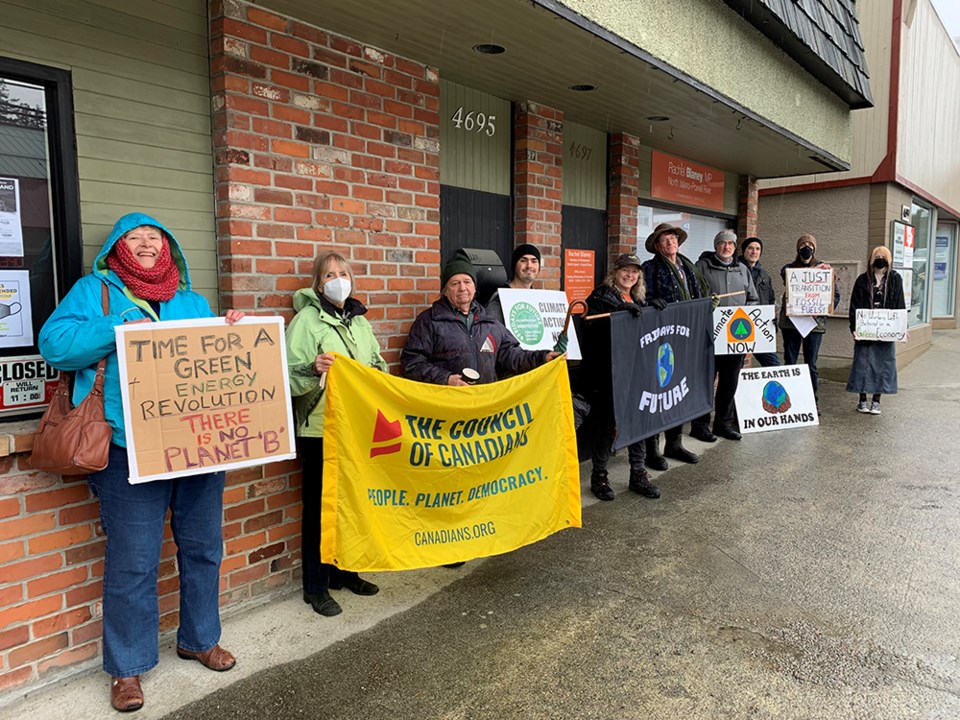A group of qathet region residents marched to the offices of four levels of government to advocate for what they termed a just transition for workers affected by the move away from fossil fuels.
On March 12, the group, carrying signs, went from city hall, to Powell River-Sunshine Coast MLA Nicolas Simons’ office, to the qathet Regional District (qRD) office and the office of North Island-Powell River MP Rachel Blaney, posting a notice in each location.
Bob Hackett, a participant in the walk, said it was the idea of one of the members of the qathet Climate Alliance to join in with national rallies and events scheduled for March 12, and coordinated nationally by 350.org and the Council of Canadians.
“We in the qathet Climate Alliance, which used to be Climate Action Powell River, decided we’d like to do something to participate; it was very informally and quickly arranged,” said Hackett. “The idea was to do something like Martin Luther did in the 1500s, which was to go around and post messages on doors, which we did with the four levels of government locally. We were also carrying signs about the need for a just transition. There were about 50 events, nationally.”
Hackett said the transition to a lower carbon energy regime inevitably is going to involve some economic adjustments.
“We don’t want to leave anybody behind,” said Hackett. “Workers, and organizations like unions, as well as communities, could be involved in planning how we do that.”
Hackett said it’s important for places such as Powell River that have historically been single-industry towns dependent on extraction of resources. He said it’s one thing to move to a lower carbon economy, but technological changes in the extraction industries are also causing job losses, and there are shifts in global commodity markets, which are “very volatile.”
“We need a plan B, and we need one that is fair and doesn’t leave people stranded and feeling marginalized,” said Hackett. “The events were intended to encourage prime minister Trudeau to carry through with what he has been promising, and that is a federal Just Transition Act.
“It’s been promised for a long time but it has been slow in coming,” said Hackett. “We need community benefits as we shift from one industry to another.”
Hackett said the just transition is an idea that has been developed within the labour movement. Success will require political will and community engagement, he added.
“We want prosperity and good jobs for people,” said Hackett. “If you’re going to move to a low-carbon economy, you’ve got to get everyone onboard.
“It’s also a way of challenging the stereotype of environmentalists as latte-drinking urban dwellers. It is about workers. It’s very much an important part of the coalitions that we need to move forward to a sustainable future. We now need to be putting this on the table of how we plan the community’s future.”
Hackett said just transition involves reinvestment in more sustainable forms of energy and less carbon-intensive industries.
The notice posted at the various government offices stated that it has been nearly three years since Justin Trudeau promised a Just Transition Act.
“With every year that passes, we are running out of time to make the changes needed to address climate change,” the notice stated. “What we need now are all levels of government and communities working together towards transformational change where we can live within planetary boundaries and meet the needs of people.
The notice also stated the following:
“The challenge is great but none of us are to face it alone. We need a just transition, and we need to work together to make it happen. Meaningful climate action requires a steep decrease in fossil fuel use, which in turn requires economic justice for workers in industries that rely heavily on fossil fuels.
“It also requires systems to meet the needs of all who rely on the fossil economy today for heat, transport, and food. This just transition must also extend to the most vulnerable and marginalized people globally who are already bearing the worst impacts.
“Many jobs in industries could disappear as fossil fuels face depletion and eventual elimination. Workers in all industries that rely heavily on fossil fuels deserve a just transition to decent jobs with a future as the world starts leaving fossil fuels behind. We no longer have the luxury of decades to make these changes happen and need bold transformational action now.”


